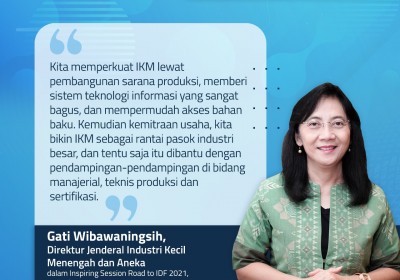Government Assists IKM Upstreaming and Downstreaming to Boost Competitiveness
July 16, 2021
JAKARTA – Small-to-Medium Industries (IKM) make up 99.7% of Indonesia's total business entities, employing 66.25% of the country's entire workforce. However, their total output is only 21.22%.
According to the Industry Ministry's (Kemenperin) director general for small, medium and miscellaneous (IKMA) industries Gati Wibawaningsih, this presents a challenge for the country as they must figure out a way to bolster the output of IKMs to the point by preparing them to be export ready. Currently, most IKM markets are still very segmented, and many are unable to mass produce their goods.
The government plans to provide further assistance and guidance for IKMs wishing to upgrade and improve their competitiveness, with help from Presidential Decree No. 29/2018 on industrial empowerment.
"However, because IKMs tend to employ many people, the government must also focus on providing wider job opportunities. Doing so will help strengthen the national industrial structure," Gati said during the Road to IDF 2021 Inspiring Session webinar on Tuesday (29/6).
Furthermore, she added that if the national industrial structure has been strengthened then more partnerships can take place between IKMs and various relevant stakeholders. Since 2020, the government began to place IKMs at the heart of the domestic supply chain.
Through measures put forth by the Kemenperin, the government has outlined 5 programs aimed to help improve IKM competitiveness including improving financial access, raw material access, technological access, access to better means of production, market access and developing product and worker quality.
"Why worker quality?" Gati asked. "Because they are the most crucial factor. Any piece of technology or app will not function well if the people responsible for running it and creating it don't fully understand it".
She added that the government has already assisted IKMs from the downstream to the upstream processes for years now. "However, if we are able to integrate this effort with the improvements we seek, then IKM development will run smoother for all involved, and our Indonesia Maju 2030 goal will be achieved quicker," she said.
Regarding exports, the goal is to develop the quality of IKM products to the point where their products will be easily accepted by target markets. The problem with IKMs in Indonesia, Gati explained, is that many of them are unaware of how to penetrate the export market and what documents are necessary to facilitate their entry. Many are also burdened by the idea that exporting will cost a lot of money and are also inefficient in distributing their goods on a larger scale.
However, IKMs should not only look to the export market to expand their reach, as the retail market and even selling to large-scale industries provide them with an opportunity to grow themselves.
"We are strengthening IKMs through improving the infrastructure they can function in, providing them with quality technology to do so and giving them better access to raw production material. To bolster partnerships, we are making it compulsory for large-scale industries to source their production materials from IKMs, which in itself can help IKMs improve their managerial, technical and certification aspects," Gati said.
Indonesia’s Research Institutions Supporting the Development of the Electric Vehicle Industry
Indonesian Muslim Fashion and Cosmetics IKMs Shine at Dubai World Expo 2020
Govt Steps Up UMKM Transformation Efforts in the Midst of Pandemic Slowdown
Govt Encourages Promotion of IKM Products in Digital Era
Government Begins Developing Maritime Training Center in Makassar
Tweets by IDDevForum
